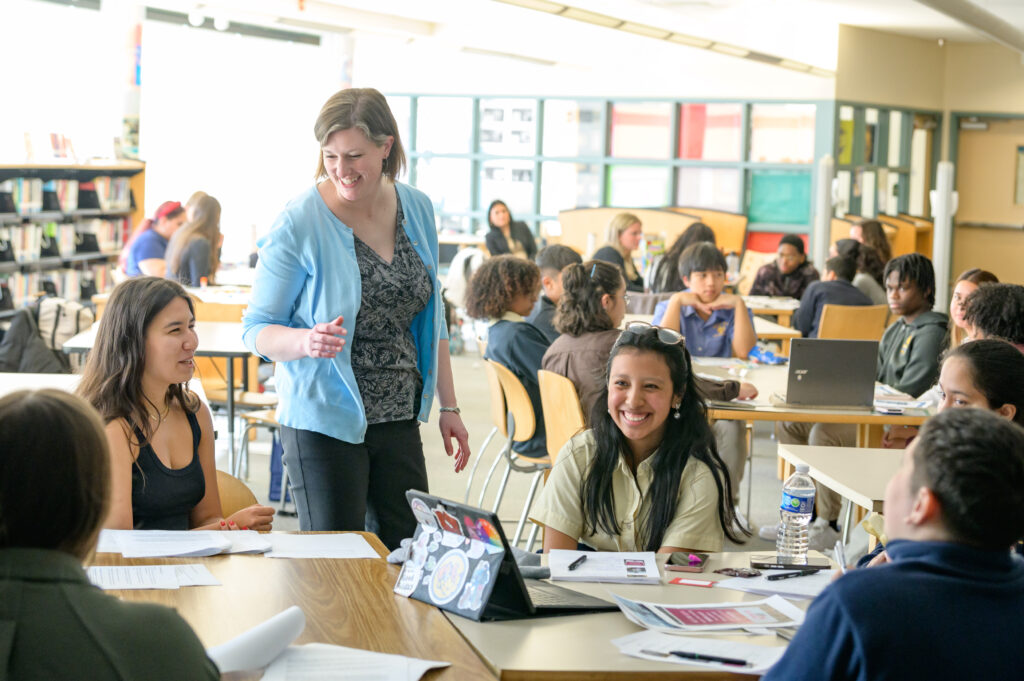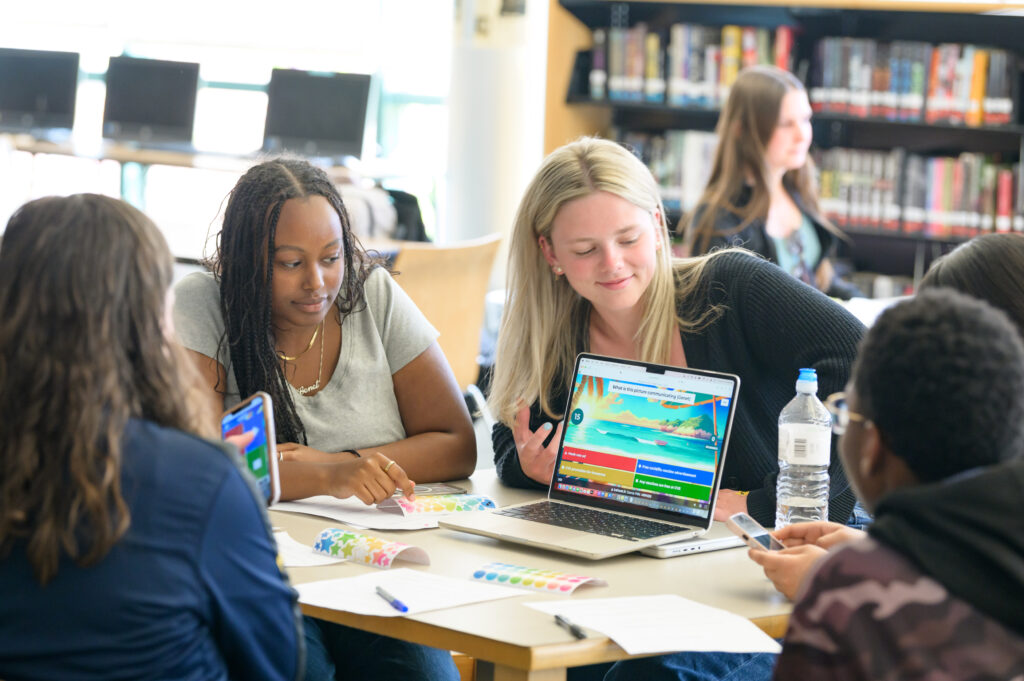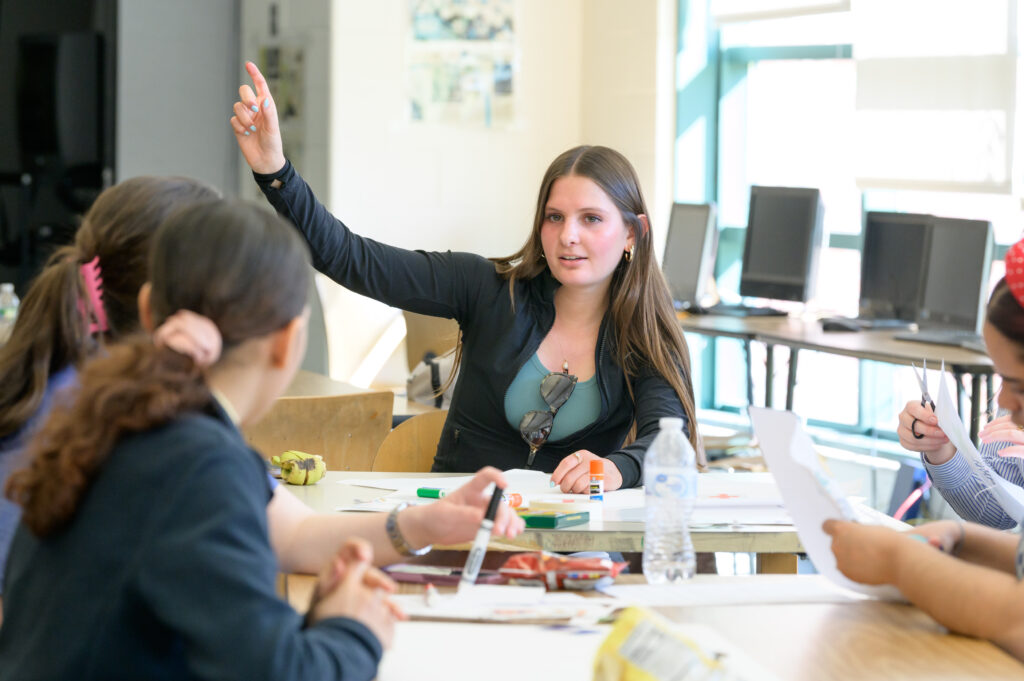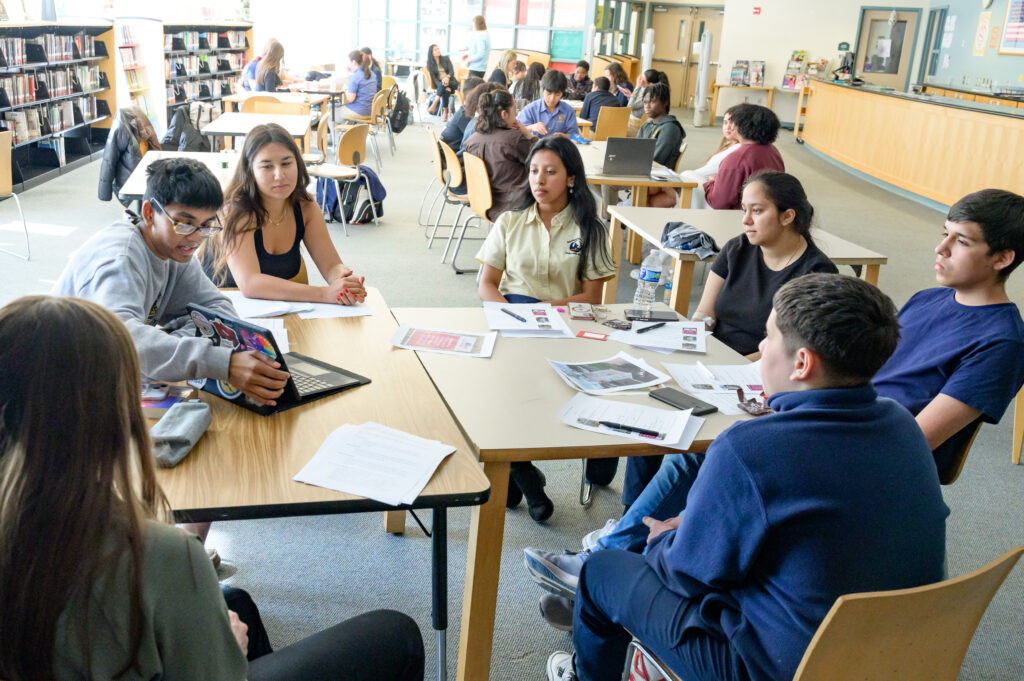Trinity’s Global Health Humanities Gateway Teaches Hartford Students about Health Communication
Students in Trinity’s Global Health Humanities Gateway, a first-year program focused on the intersection of health and the human experience, recently passed along some of their knowledge to younger students in Hartford.

During an April 26 workshop called “Navigating Health Communication in Hartford,” the Trinity students taught high schoolers at Hartford Magnet Trinity College Academy about public health and how to notice and interpret the health communication they see all around them.
Using the knowledge they gained throughout the semester, the Trinity students developed a series of presentations, small-group discussions, games, and hands-on activities that focused on various topics, in order to spread awareness about certain public health issues.
“The purpose of the workshop was to teach students about health rhetoric, but to also allow them to understand the complexity of health, given the way in which it is communicated and represented,” said Ella Schaffer ’27. “The activities and presentations promoted thoughtful discussion during which students shared their own experiences with health communication which had previously been overlooked.”
The Gateway Programs at Trinity are offered to first-year students with specific interests and experiences. Each program consists of a series of two to four courses and focuses on a different specialized area, including community action, the arts, and STEM fields.
 The Global Health Humanities Gateway, which consists of two courses, is co-directed by Erin L. Frymire, lecturer in the Allan K. Smith Center for Writing and Rhetoric, and Diana R. Paulin, Charles A. Dana Research Associate Professor of English and American Studies. The first course acts as an introduction to the field and examines how medical practices overlap with other disciplinary arenas, including philosophy, literature, religion, film, and art. The second course gives students the opportunity to extend this knowledge into hands-on projects in the Hartford community. Students also take one course from a list of health-related electives during their first year and then complete a capstone project by studying health abroad or completing an independent community project in Hartford.
The Global Health Humanities Gateway, which consists of two courses, is co-directed by Erin L. Frymire, lecturer in the Allan K. Smith Center for Writing and Rhetoric, and Diana R. Paulin, Charles A. Dana Research Associate Professor of English and American Studies. The first course acts as an introduction to the field and examines how medical practices overlap with other disciplinary arenas, including philosophy, literature, religion, film, and art. The second course gives students the opportunity to extend this knowledge into hands-on projects in the Hartford community. Students also take one course from a list of health-related electives during their first year and then complete a capstone project by studying health abroad or completing an independent community project in Hartford.
“Global health humanities is a recently emerging field which uses the materials and methodologies of humanities fields to study health and healthcare,” said Frymire. “Using the humanities gives a fuller understanding of the human experience of health.”
The second course in the program, “Rhetorics of Health & Hartford,” led by Frymire, teaches students how to incorporate rhetoric into health communication, including doctor-patient interaction, medical research, and public health discourse. The course also focuses on health communication in the city of Hartford through the analysis of health-related messages around Hartford and observes the ways in which this health-related information placed on things such as billboards, pamphlets, bus ads, and radio commercials impacts the community.
 Frymire said, “Our goal is to try to understand what the health communication is in and around the city.” The workshop about health communication for local high school students served as the culmination of the course.
Frymire said, “Our goal is to try to understand what the health communication is in and around the city.” The workshop about health communication for local high school students served as the culmination of the course.
Santina Dresser ’27 said that the Global Health Humanities Gateway illuminated the pervasive nature of healthcare communications in daily life. “Working to bridge healthcare with the humanities, these courses have provided a very unique perspective that I will be able to carry with me as I pursue a scientific career,” Dresser said.
While this Gateway program has existed at Trinity for many years, this year marked its first direct connection with HMTCA. Frymire said, “The goal has always been to try to figure out how we share this analysis and make it useful or interesting for someone beyond our class. We wanted to get this out into the community in some way. There’s so much opportunity for collaboration between these two institutions.”
 The Trinity-HMTCA partnership is just one of the relationships with the Hartford community that are supported by Trinity’s Center for Hartford Engagement and Research (CHER). Liliana Polley IDP’21, M’23, director of CHER strategic partnerships, said, “These programs are designed to strengthen and evaluate academic and co-curricular partnerships between Hartford’s communities and Trinity College’s students, staff, and faculty, thereby fostering a sense of shared growth and development.”
The Trinity-HMTCA partnership is just one of the relationships with the Hartford community that are supported by Trinity’s Center for Hartford Engagement and Research (CHER). Liliana Polley IDP’21, M’23, director of CHER strategic partnerships, said, “These programs are designed to strengthen and evaluate academic and co-curricular partnerships between Hartford’s communities and Trinity College’s students, staff, and faculty, thereby fostering a sense of shared growth and development.”
Polley added that the Global Health Humanities Gateway workshop stood out as an example of these connections in action. “I hope that all students involved saw this workshop as an opportunity to interact with and learn from our Hartford neighbors,” said Polley. “This type of workshop demonstrates opportunities on how teaching and research can benefit the communities around us, and how we can create meaningful connections through our work.”
Learn more about the many academic and co-curricular partnerships between Hartford’s diverse communities and Trinity College here.
